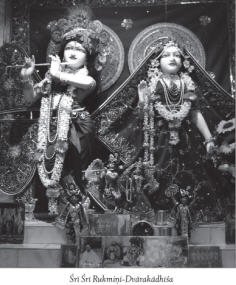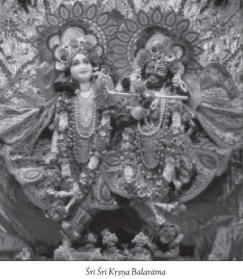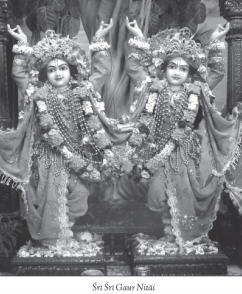What, why, how and other questions about Deity worship.
Can you show me God?
Of course, He is right here, standing on the altar.
Oh, this is just a stone figure! Show me the real God?
Please be patient. At present we don't have the vision to see the spiritual form of he Lord; therefore, out of His causeless mercy He has come in a form we can appreciate. We can only see material things and therefore He has accepted a form of stone and wood. In this way we can see His form and offer our worship to Him.
But these are man made imaginary forms. How can we assume them to be divine?
God is a person and not some impersonal void as some people may have us believe. If the children are indi vidual persons, it is difficult to present a case for an impersonal father. How could an impersonal oneness give rise to individual personaIities?
Just as a child separated from his father may speculate about how his father looks like, we too, in separation from God, our eternal father, may speculate about how God must be like. Our speculative attempts to know our father, who existed before we came into being, are sure to be frustrated just like the attempts of a child will be, if he tries to search for his father throughout the town. There is one remedy however – the revelation of knowledge about the father by the mother. In our case, the Vedas supply us intimate and detailed information about God, our eternal father. They give us accurate knowledge about the form of God. So, the Deities that are carved are not whimsical icons but epresent the actual form of God. Even the proportions fro carving Deities have been specified in the scriptures and have to be strictly followed.
Alright, I accept that the Deities accurately represent what God looks like, but that still does not explain why you worship the Deity as if it were actually God Himself?
God is all-spiritual and everything is God's energy. Therefore all of God's energy is also spiritual. We may call it 'material' or 'spiritual' according to how it acts upon us, but in reality it is one spiritual energy. Just like electricity is one single energy, but sometimes it works in a refrigerator to cool things and sometimes in a stove to make things hot. An expert electrician can use it to perform either function. Similarly, the Lord, the master of all energies, can turn matter into spirit and vice versa, at His will. Therefore, even if we accept the Deity as being stone we must admit that if He so desires, the Lord can appear in the Deity form just so that he can accept serv ice from His dear devotee and reciprocate to the service rendered.
Well, if God is in stone then why not worship the marble on the floor. It's the same as the Deity, isn't it?

True, both the Deity and the floor are made of the same material. But, there is a lot of difference between them. Undoubtedly, there is difference between a thousand rupee note and a newspaper although both are made of paper. If someone tears a week old newspaper you will not even blink an eyelid, but if the same person even attempts to tear your thousand rupee note you will burst into a rage. Why is it so? Because the currency note is not an ordinary piece of paper, it is authorized by the government, while the newspaper does not undergo any such authorization.
Similarly, the Deity is special because it is authorized by installation or prana-pratistha ceremony by the pure devotees of the Lord. They invite the Lord to appear in the Deity so that they may render service to the Lord. And because the devotees are dear to the Lord, He reciprocates. The Lord says in the Padma Purana :
naham tisthami vaikunthe
yoginam hrdayesu va
tatra tisthami narada
yatra gayanti mad-bhaktah
"0 Narada, I am not in Vaikuntha nor am I in the hearts of the yogis. I remain where My devotees glorify My name, form, qualities and transcendental pastimes."
The worship carried out in bonafide temples is of such bonafide Deities, and not of unauthorized statues.
If God is omnipresent then why insult him by limiting Him to a statue?
If God is omnipresent, then why is He not present in the Deity?
God is not only omnipresent but also omnipotent and all owerful and can manifest in full even in a small Deity. The Deity form is not a symbol of limitation, but that of causeless mercy.
The radio waves are everywhere, but we need a radio set to appreciate them in the form of sound. Similarly, even though God is omnipresent, we can appreciate and serve Him when He is present before us in the form of a Deity.
If Krsna is non-different from His Deity, why couldn't he save Himself when so many temple and Deities were destroyed by invaders in the past?
In the Bhagavad-gita(4.11), Lord Krsna says "ye yatha mam prapadyante".We should understand that just as Lord Krsna can appear in the Deity by His own will at the request of His devotee, He can similarly disappear from the Deity by His will, on seeing an envi ous person. Also, sayisng that by breaking the Deity, someone has destroyed God is like say ing that by destroying the post-box, the entire postal department is destroyed. We can see that those who caused such destruction are dead and gone, while Lord Sri Krsna is still very much in charge of everything.
Also as mentioned above, Lord Krsna reciprocates with the attitude of all. He allows His devotees to build a temple and render service to the Deity, and it is this service that is the eternal credit not the physical temple. Similarly, with the atheistic, The Lord reciprocates by allowing them to break the temple and such acts certainly bear sinful results to them.
Some people worship five Deities as main. What about them?
Not understanding the process of disciplic succession, so-called logicians put forward the theory of pancopasana, in which a person worships one of the five main Deities namely Lord Visnu, Lord Siva, Durga-devi, Ganesa and Surya. However, Lord Sri Krsna says in the Bhagavad-gita(9.25) :
yanti deva-vrata devan
pitrin yanti pitr-vratah
bhutani yanti bhutejya
yanti mad-yajino 'pi mam
"Those who worship the demigods will take birth among the demigods; those who worship the ancestors go to the ancestors; those who worship ghosts and spirits will take birth among such beings; and those who worship Me will live with Me." Thus, the result of worshipping someone other than Lord Sri Krsna is clear – the result is totally different from the result attained by worshipping Him.
Worship is from heart. Why take trouble of doing opulent Deity worship?

At the present moment, we don't know how great God or His Deity is, but we have sufficient understanding of the value of gold, pearls, diamonds and other precious stones. When we see such opulent paraphernalia being used in the service of Lord Krsna, we naturally think, if the Lord is being offered such costly items, surely He must be great. Thus this practice helps in developing an attitude of respect towards the Deity.
Otherwise in our enjoying spirit we will view the Deity also as an object of our sense gratification just as we observe the rest of the world. Even Lord Krsna says in the eleventh canto of Srimad Bhagavatam(11.27.15):
dravyaih prasiddhair mad-yagah
pratimadisv amayinah
bhaktasya ca yatha-labdhair
hrdi bhavena caiva hi
"One should worship Me in My Deity forms by offering the most excellent paraphernalia. But a devotee completely freed from material desire may worship Me with whatever he is able to obtain, and may even worship Me within his heart with mental paraphernalia."
If one is pure, Lord Krsna will taste his devotion, but even if one is not, at least he should offer opulent presentations to the Deity with love, for such presentations both enhance the respectfulness of the worshipper and help him avoid offenses in his worship. Also it helps in constantly remembering that the Deity is the same Supreme Personality of Godehad.
Will this Deity of stone reciprocate like Lord Himself?
Devotees who understand the science of Krsna and who behold Him with eyes of love can directly talk with the Deity, and Krsna has no difficulty in replying to their prayers or receiving their offerings. If one thinks that the Deity is a stone idol, then it will remain a stone idol forever. But if one elevates himeslf to the higher platform of Krsna consciousness, then Krsna will talk with him. The Deity of the Lord can act exactly as He does in His original transcendental personality. But one who is serving the Deity with love and faith, to him only, Krsna will reveal and give intelligence.
The devotees express their minds before the Deity, and in many instances the Deity also gives answers. But one must be a very elevated devotee in order to be able to speak with the Supreme Lord. Sometimes the Lord informs the devotee through dreams. For example the Gaudiya Vaishnava commentary on Vedanta-sutra was revealed to Srila Baladeva Vidyabhusana by the Deity of Govindji, which is presently in Jaipur.
In time, the body, mind and senses of the devotee become spiritualized by serving the Deity, and the Supreme becomes fully manifest to him or her. This can continue up to a level in which the Supreme Being in the form of the Deity engages in a personal relationship and performs reciprocal, loving pastimes with the devotee, as has previously taken place with other advanced individuals. For those who have experienced such an exchange with the Supreme or His Deity, this stage of worship of the Supreme Being in the Deity moves up to a whole different level, with no limits to the spiritual love that can be shared between the devotee and Lord.
How should I meditate on the Deity of the Lord?
The best way to take darsana is to get more and more realization that Lord Krsna is actually there. We should begin the darsana by meditating on His lotus feet, and when we are practised in this way, we can look at His thighs, His waist, His chest, hands, and dress. Then we can reach His smiling face and meditate on His flute, His consort Srimad Radharani and the other gopis surrounding Him. We should also keep hearing about Krsna. These two processes will increase one's devotion in such a way that one will automatically become a pure hearted devotee.
What will be the result of meditating on Deity?
Simply by visiting the temple and seeing the Deity regularly one will gradually be disinfected of all material desires. tad-darsana-dhvasta -samastakilbisah (Srimad-bhagavatam 6.16.31) . When one is freed from all the results of sinful activities, one will become purified, and with a healthy mind, completely cleansed, he will increasingly make progress in Krsna consciousness. Also, chanting and hearing His names evokes attraction to His form, which the Lord eventually manifests to the pure chanter. As we become attracted to the form of the Lord, we will give up trying to enjoy other forms, an effort that simply leads to exhaustion. We will know then that only Krsna can satisfy us.
Lord Krsna says in Bhagavad-gita(l 2.l4) mayy arpita-mano-buddhir. yo mad-bhaktah. 'In this way, one who executes devotional service, sa me priyah, 'he is very dear to Me.' So if you want to be dear to Lord Krsna and to be seen by Him, Deity worship is the surest way.
Why spend so much money on celebrating opulent festivals while the nation has so many people suffering from poverty?

First, we should understand that the problems of hunger etc. of this world have nothing to do with the money spent for worship of God in temples. Hunger and other problems in the world are caused due to the mismanagement and greed of some people. Even today, the earth produces enough to feed the whole population. But, it is greed of a few unscrupulous men which prevents the food from reaching the mouth of the needy, as is evident by regular exposures of scams like rice scam, fodder scam etc. These scams caused by corrupt and greedy people are the cause of poverty and hunger prevalent in the world today.
The question that must be raised is why so much money is being spent on security and other facilities of such people?
In fact, if the temples are established properly & vedic techniques are taught to the people, it will go a long way to remove poverty. A person who comes to temples and hears from the right person will automatically become selfless & will practice the quality of 'sharing' in his life and behaviour. Such a person wil help in solving the problems mentioned above.
Also, we have to understand that the Lord is the real owner and enjoyer of this world. Just like so much money is spent in the service of the President, who is the first citizen of the country, money should be spent in the service of the Supreme Lord, who is the supreme owner, enjoyer and benefactor of the entire universe. If so much money can be spent on temporary ministers, in comparison, very less is spent in service of t he Lord.
The aim of temples is not just to carry out Deity worship but also to spread the teachings of scriptures which will automatically create nice gentlemen citizens.
If holy name is the yuga-dharma then why do Deity worship?
Yes, to attain perfection in spiritual life, chanting of the holy names is recommended. According to the vedic scriptures, there are two methods – bhagavat-vidhi and pancaratriki- vidhi. These are like two rails onwhich bhakti moves ahead.According to Srila Prabhupada, both are essential.
Especially for a sadhaka who is not yet advanced and is engrossed in materialistic activities, Deity worship is very a important path for advancement. As such, a conditioned soul has no taste for chanting the holy names and is accustomed to enjoying his senses . By Deity worship, one can understand that he is not the supreme enjoyer. The conditioned soul learns to offer to the Lord all excellent, enjoyable items and so, be purified of all desire to become the Lord himself.
At the same time, for a conditioned soul to see Lord Krsna personally is impossible given his conditioned stage. But the Deity gives him an opportunity to serve the same supreme Lord in a manner perceptible to his material senses. Thus, it offers him a chance to purify his existence.
As mentioned above, Deity worship and chanting of holy names go hand in hand. The process of Deity worship includes chanting of the holy names. Wherever in the temple, the Deities are worshipped, holy names have to be chanted. Otherwise, a temple with just Deities, and without regular chanting in the temple has no significance.
For all these reasons, Deity worship is recommended by scriptures and acaryas.
Madan Gopala Dasa Serves at ISKCON Mumbai and is associate of 'jau Devachiya Gava', the Marathi edition of Back To Godhead. Murari Gupta Dasa, M.B.B.S., too serve full-time at ISKCON Mumbai and is a part of BTG India team.
